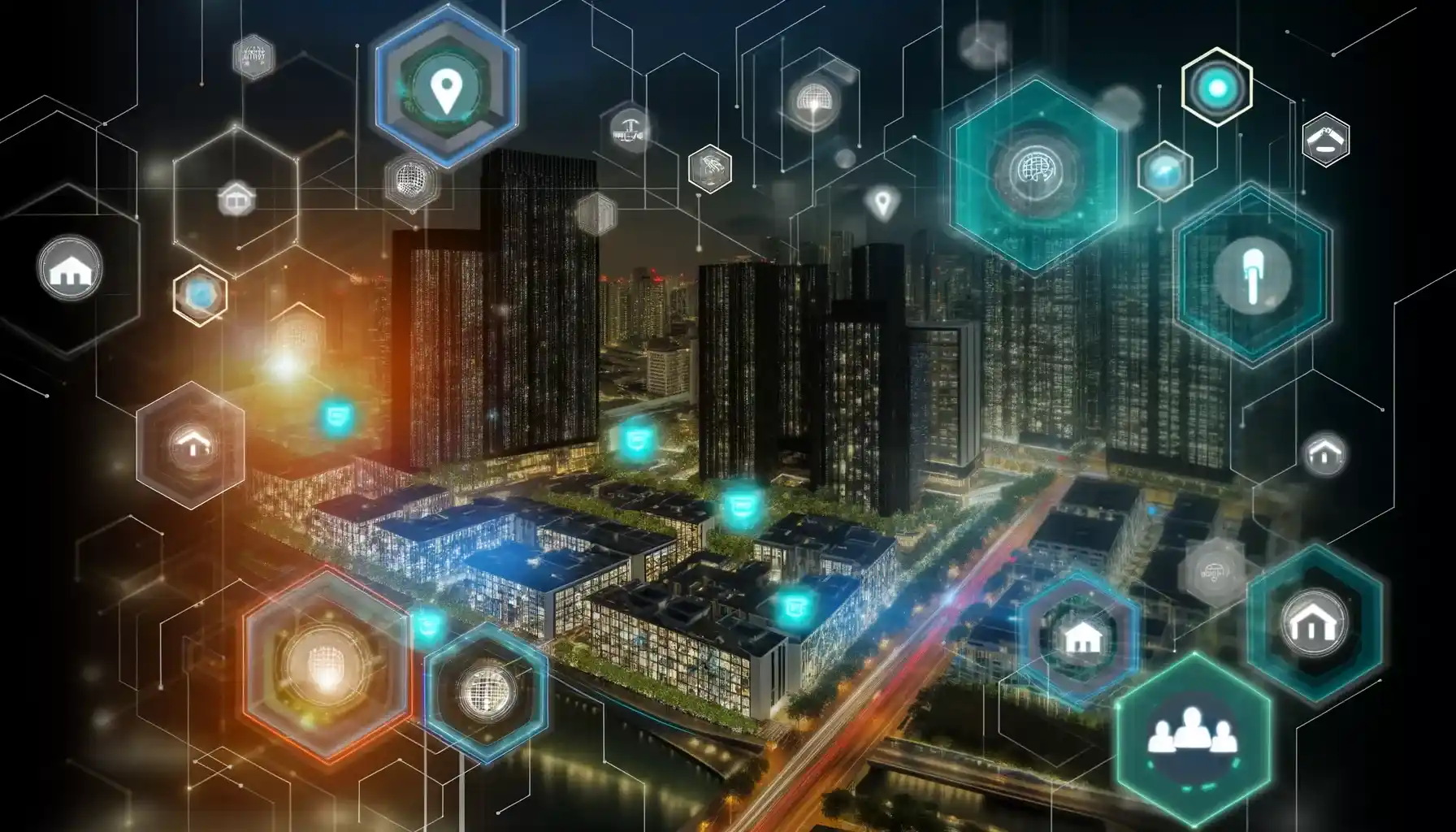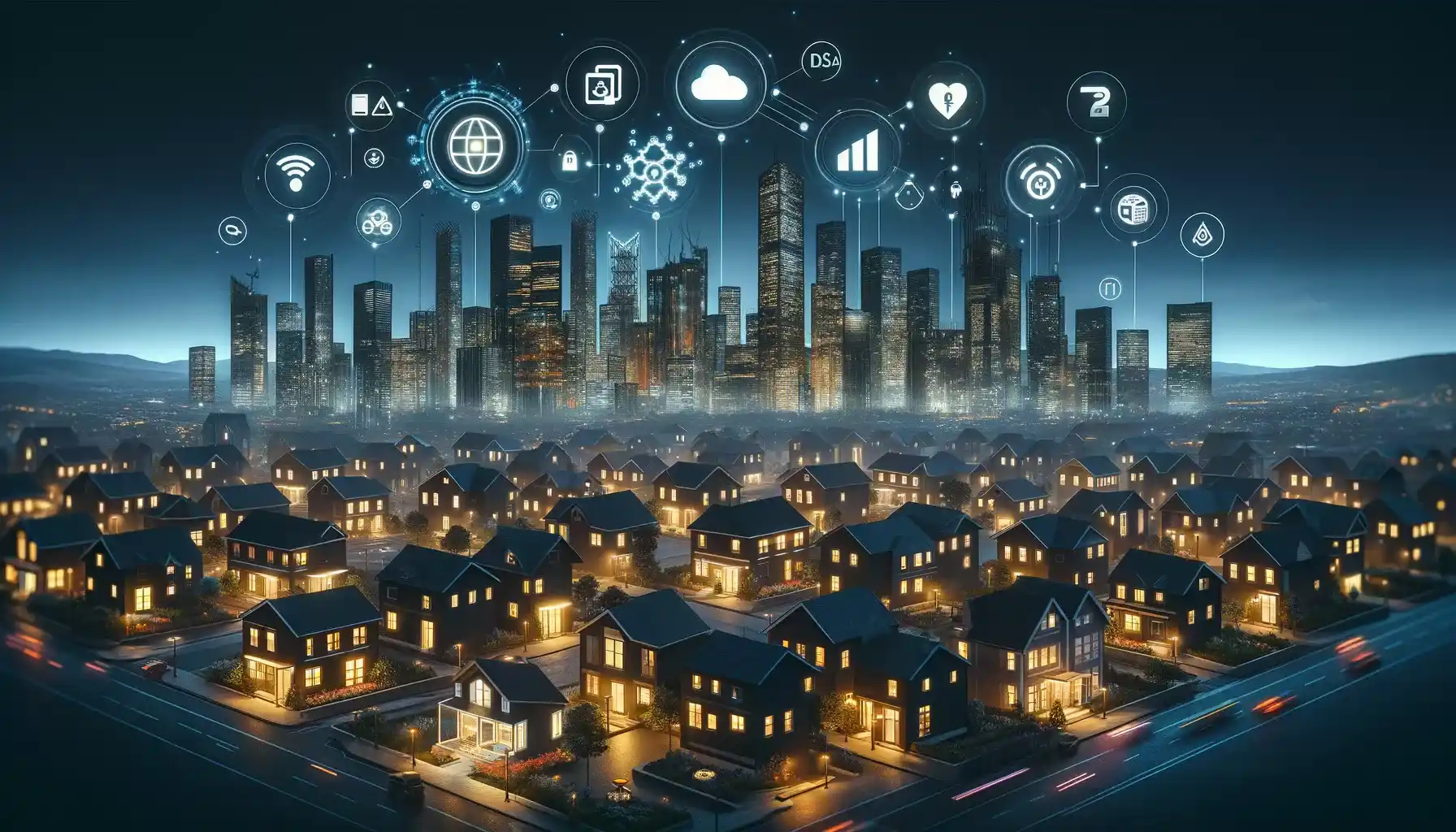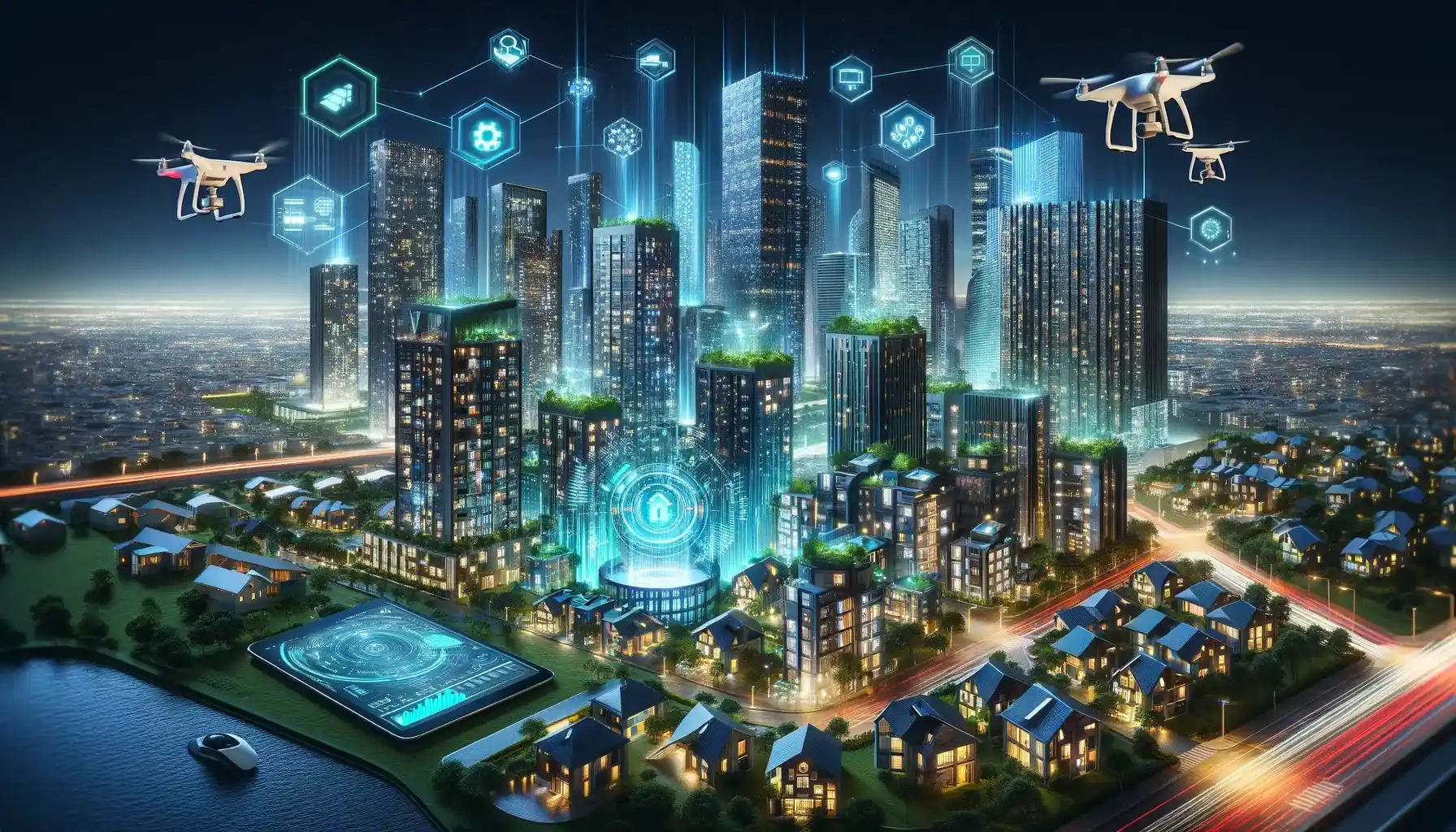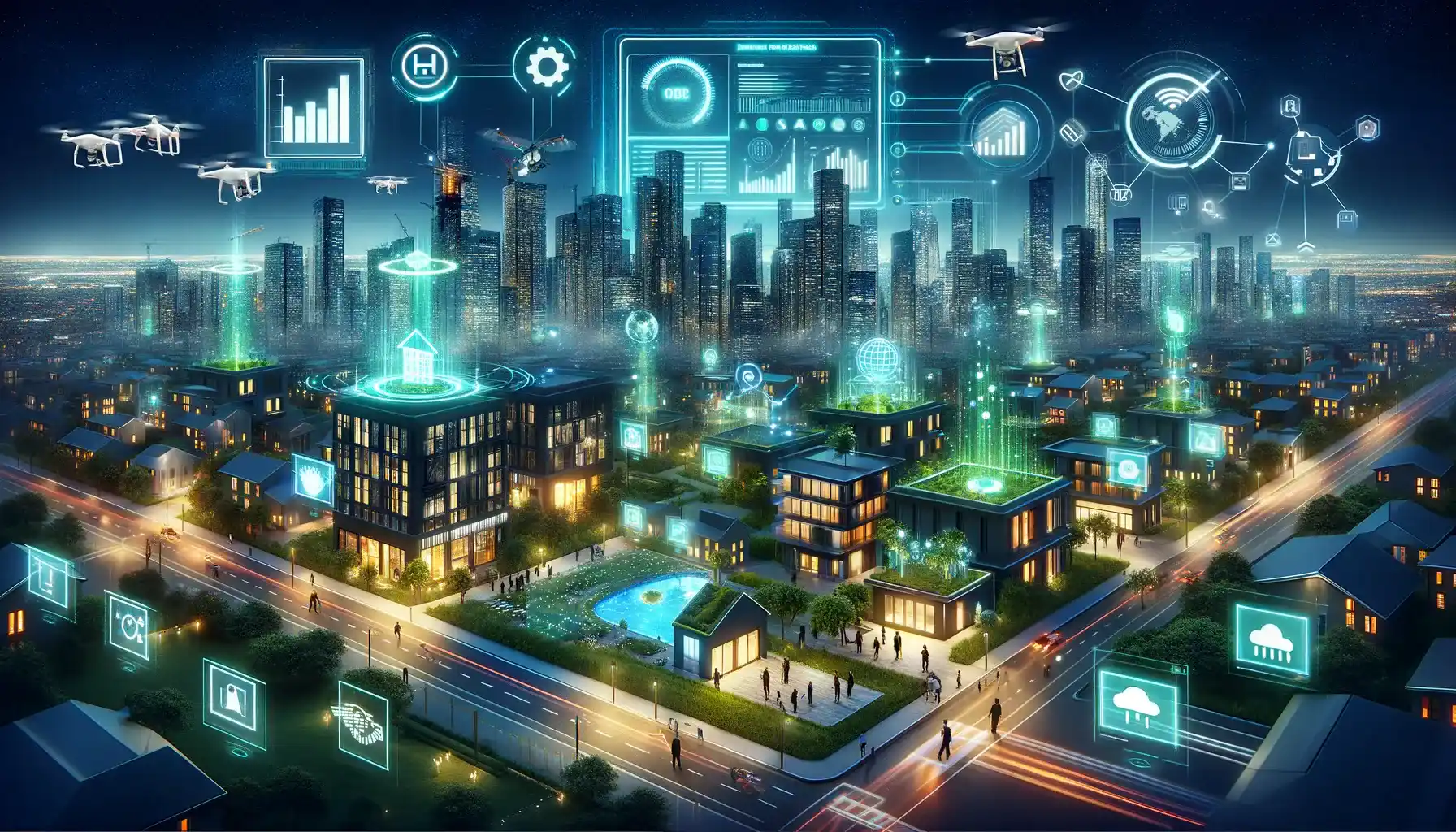Table of Contents
In today’s real estate realm, Proptech is more than just a buzzword; it’s a catalyst for innovation and disruption. By seamlessly integrating technology into every facet of the industry, Proptech is a remedy for paperwork woes and a lucrative asset class for investors seeking fresh opportunities.

What Is Proptech?
Proptech, short for property technology, encompasses innovative tools transforming real estate transactions, management, and marketing. It merges real estate with technology, enhancing efficiency and user experience across the industry. Whether termed Real Estate Tech, Retech, or Commercial Real Estate (CRE) Tech, the essence remains a strong fusion of real estate and technology.
Illustration of Proptech
Real Estate Technology Trends:
- Proptech Platforms: Leading platforms such as Zillow and Airbnb leverage real estate technology trends to simplify property transactions. They offer features like listings and virtual tours, enhancing user experiences and streamlining the buying and renting process.
- Property Management Solutions: Real estate technology trends drive tools like Buildium and Appfolio, which streamline operations for property managers. These solutions facilitate rent collection, maintenance tracking, and tenant communication, improving efficiency and organization.
- Shared Economy Real Estate: Real estate technology trends fuel the growth of shared economy real estate, exemplified by Airbnb. Individuals can rent out their properties for unique travel experiences, maximizing space utilization and unlocking additional income streams.
- Smart Homes: Proptech integrates IoT devices into smart homes, enhancing convenience, security, and energy efficiency. These real estate technology trends enable remote monitoring and control of various home systems, improving comfort and sustainability.
- Fintech Integration: real estate technology trends merge with Fintech to facilitate seamless payments and innovative financing solutions. This integration simplifies transactions, enhances affordability, and expands access to real estate investments.
- Contech Innovations: real estate technology trends drive construction tech advancements like 3D printing, improving construction efficiency and safety. These innovations streamline the building process, reduce costs, and enable more sustainable construction practices.

The Proptech Landscape
With over 9000 proptech companies worldwide, the industry presents a vast array of solutions. Categorizing them into seven segments, we provide a comprehensive outlook on the proptech landscape:
- Tools for Agents and Brokers: Platforms like Zillow utilize real estate technology trends to empower agents and mortgage broker with listing management, client relationship tools, and data-driven market analysis, streamlining processes and improving decision-making.
- Solutions for Property Managers: real estate technology trends enable platforms like Buildium and Appfolio to automate tasks such as rent collection and maintenance scheduling, tracking rental property expenses, enhancing operational efficiency and tenant satisfaction.
- Fintech Integration: Fintech solutions like Roofstock leverage real estate technology trends to facilitate online real estate investment, offering diverse opportunities, streamlined transactions, and financial insights to investors.
- Construction Tech Innovations: real estate technology trends drive construction technology solutions, optimizing project management and enhancing quality outcomes through tools like BIM software and construction robotics.
- Investment and VC Solutions: real estate technology trends enable platforms such as RealCrowd and Cadre to connect investors with real estate opportunities, offering diversified portfolios and alternative investment strategies.
- Climate Tech Advancements: real estate technology trends in climate tech focus on sustainability and environmental impact reduction, with innovations in energy efficiency, renewable energy integration, and smart building management systems.
- Democratizing Access: real estate technology trends democratize access to services and information, exemplified by platforms like Airbnb and smart home technologies, which benefit property owners, tenants, and homeowners alike.
Residential and Commercial Property Tech
- Residential Proptech: This sector focuses on digital solutions for residential property management and transactions. Platforms like Zillow and Airbnb streamline processes. Trends include smart home tech, Fintech for mortgages, and platforms catering to the shared economy.
- Commercial Proptech: Commercial Proptech manages office, industrial, and retail spaces. Software like Buildium optimizes operations. Trends include IoT for automation, Fintech for leasing, and Contech for construction.
Real Estate Technology Trends

Proptech has catalyzed significant shifts in the real estate industry. Notable trends include:
- AI and Machine Learning Automation: Proptech leverages AI and machine learning to automate tasks like property valuation and market trend analysis, enhancing efficiency and accuracy.
- Big Data & Digitalization: Utilizing big data, Proptech provides real-time insights and streamlines processes through digitalization, improving transparency and decision-making.
- Virtual Reality Immersive Experiences: VR technology offers immersive property tours, boosting visibility and speeding up decision-making, a key aspect of real estate technology trends.
- IoT for Predictive Maintenance: IoT devices enable predictive maintenance, monitoring property conditions, and optimizing energy usage, adding value and efficiency to real estate operations.
- ClimateTech and GreenTech Sustainability: Proptech integrates ClimateTech and GreenTech solutions for sustainable real estate practices, aligning with environmental goals and reducing costs.
- Blockchain and Tokenization for Investments: Blockchain enables secure transactions and fractional ownership, democratizing property investments and enhancing market liquidity, reflecting real estate technology trends.
Real Estate Tech Startups
- Real Estate Agent and Brokerage Tools: These tech solutions cater to agents and brokerages, streamlining tasks like client management and lead generation, aligning with real estate technology trends to boost efficiency.
- Property and Facility Management Solutions: Focused on optimizing property operations, these startups offer software with maintenance scheduling and tenant communication features, reflecting real estate technology trends by enhancing tenant satisfaction and reducing costs.
- Fintech Innovations: Real estate fintech startups simplify financing processes and investment accessibility with online mortgage platforms and crowdfunding tools, aligning with real estate technology trends to streamline financial transactions.
- Construction Tech Advancements: Startups in construction tech introduce AI-powered scheduling and modular techniques, fitting real estate technology trends by improving efficiency and sustainability in construction.
- Investment and VC Tools: These startups provide analytics and portfolio management for informed investment decisions, aligning with real estate technology trends to empower investors in managing real estate assets effectively. Integrating advanced real estate investor software empowers investors to strategically optimize their portfolios with precision.
- Climate Tech Innovations: Climate tech startups focus on sustainability with energy management systems and green building technologies, in line with real estate technology trends aiming to reduce carbon footprint and operating costs.
- Universal Solutions for Enhanced Operations: Offering comprehensive features like data analytics, these startups align with real estate technology trends by optimizing efficiency and decision-making processes industry-wide.

How Technology Has Changed the Real Estate Industry
- Streamlined Processes for Brokers and Agents: Proptech has revolutionized the way brokers and agents operate by providing streamlined processes and advanced marketing capabilities. With tools like virtual tours, digital document management, and predictive analytics, agents can efficiently manage listings, reach potential buyers or renters, and close deals faster.
- Improved Tenant Experiences for Property Owners and Managers: Proptech platforms offer property owners and managers innovative solutions to enhance tenant experiences and operational efficiency. Features such as online rent payments, maintenance request portals, and smart building technologies contribute to smoother property management workflows and increased tenant satisfaction.
- Better Market Insights for Investors and VC Specialists: Proptech provides investors and venture capital specialists with access to better market insights and data-driven decision-making tools. These include real-time market analytics, investment portfolio management platforms, and crowdfunding platforms, enabling more informed investment decisions and risk assessments.
- Enhanced Risk Assessment for Fintech Professionals: Fintech professionals benefit from Proptech by leveraging advanced data analytics and AI-driven risk assessment models. These tools provide deeper insights into property valuations, mortgage risks, and market trends, empowering Fintech professionals to offer more personalized and accurate client servicing.
- Improved Project Management for Construction and Development Teams: Proptech solutions have transformed project management for construction and development teams by offering digital collaboration tools, Building Information Modeling (BIM) software, and real-time progress tracking systems. These technologies enable more efficient resource allocation, cost management, and data-driven decision-making throughout the project lifecycle.
Revolutionizing Real Estate Through Proptech
Proptech, an abbreviation for property technology, represents a dynamic fusion of real estate and technology, revolutionizing the industry across various fronts. From streamlined processes for agents and brokers to improved tenant experiences and better market insights for investors, Proptech is reshaping how real estate transactions are conducted, managed, and analyzed. With innovations spanning AI-driven automation, IoT integration, Fintech solutions, and sustainability initiatives, Proptech is driving efficiency, transparency, and sustainability throughout the real estate ecosystem. As the Proptech landscape continues to evolve with thousands of companies offering diverse solutions, it’s clear that technology will play an increasingly pivotal role in shaping the future of real estate.